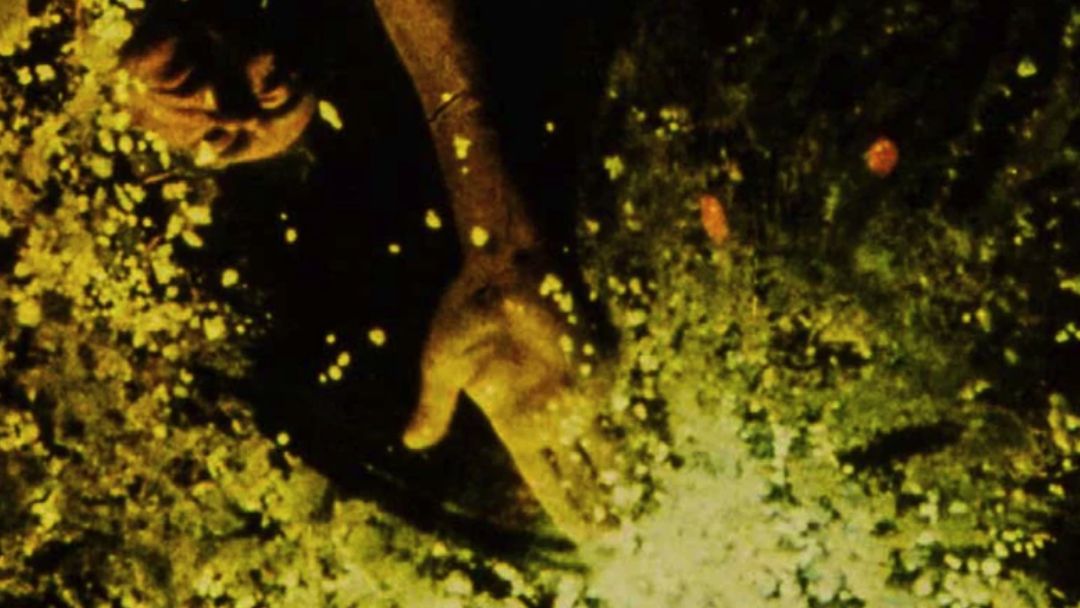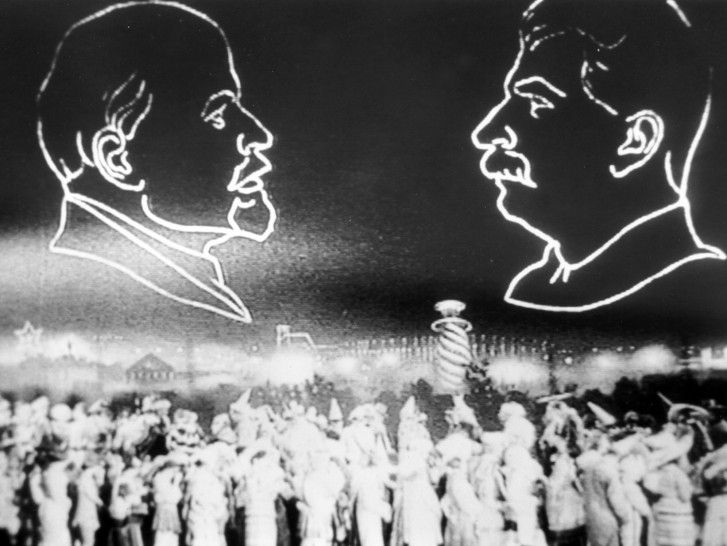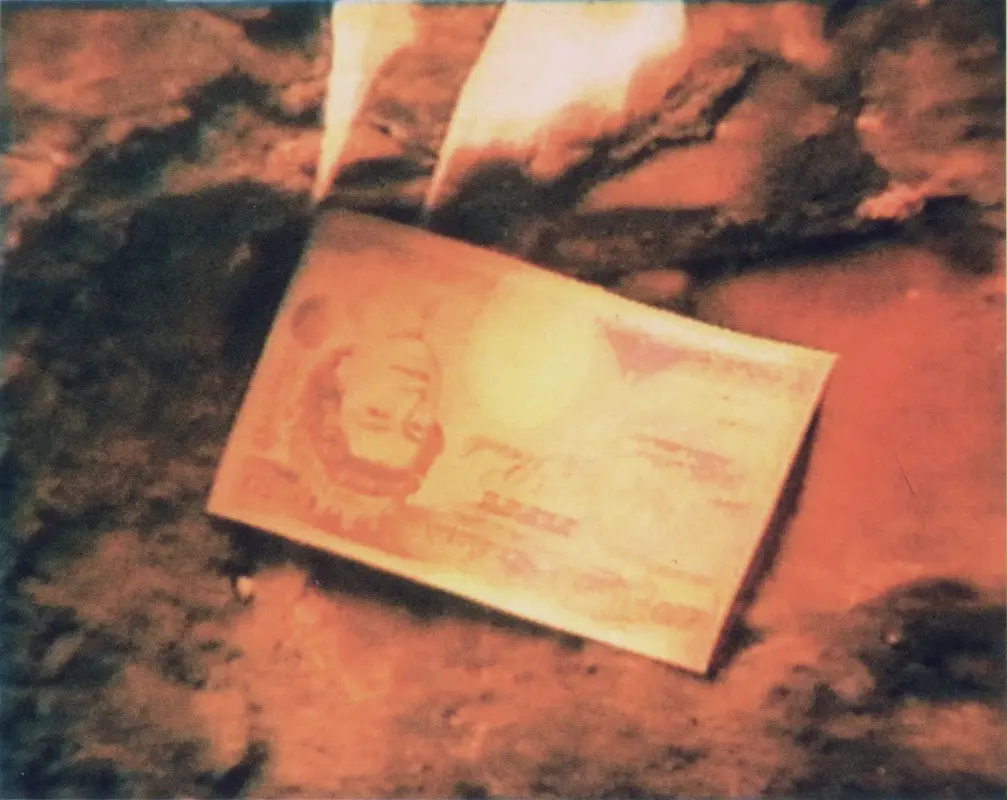Распад [Raspad / Collapse / Decay] (Mikhail Belikov, 1990)
Apr
25
1986

A young boy looks over his shoulder into the camera. He's seated at an extended table, set with food for many. A man in the back is on the phone; a woman walks around cradling a newborn child. In the corner of the room a baby cot. DP: Vasiliy Trushkovskiy.
1990s
“Parfois ils disent que nos images sont esthétiques, mais nous disons que les images esthétiques sont des images hautement étiques. Pour nous éthique et esthétique marchent ensemble. Re-filmer signifie re-signifier.”Prigionieri della guerra [Prisoners of War] (Yervant Gianikian + Angela Ricci Lucchi, 1995)
Apr
24
Armenian genocide

Horse-pulled carts arrive at a cross (via). DPs: Yervant Gianikian & Angela Ricci Lucchi.
A World War I film: a day in recognition of the forced deportations and genocide in Armenia, 1915 — 1923.
– Yervant Gianikian and Angela Ricci Lucchi in conversation with Daniele Dottorini, 2007 (via)
Re-purposed propaganda reels show citizens – displaced, dehumanised – turned into prisoners of war, and finally into corpses.
Moment of Impact (Julia Loktev, 1998)
Apr
1
1989

A person holds Leonid Loktev's head from behind, while someone else cups his left eye with one hand. DP: Julia Loktev.
“Antoine Lavoisier (1743-1794) was a French chemist who gave the first accurate scientific explanation of the mysteries of fire. He also provided the law of conservation of matter which states that matter can be neither created or destroyed.n His work and this film are situated between modern chemistry and alchemy. The film stages a drama of abstraction and theoretical realism. Everyday life seen photo-chemically and musically. The film is a materialist projected-image conversion of matter.”To Lavoisier, Who Died in the Reign of Terror (Michael Snow, 1991)
Mar
6
chemistry

Shot from below through a glass pane, a man pushes a sulphur-yellow substance around.
Chemistry: Dimitri Mendeleev presented his version of the periodic table on this date in 1869. He claimed to have had a dream in which he envisioned a table in which all the chemical elements were arranged according to their atomic weight (via).
– Michael Snow, via
The film stock was chemically altered, giving it an dreamlike quality.
Le tombeau d'Alexandre [The Last Bolshevik] (Chris Marker, 1993)
Feb
25
Warsaw Pact

Still from a Medvedkin film. Silhouettes in light of Lenin and Stalin facing each other are projected above a crowd of people. DP of Le tombeau d'Alexandre: Chris Marker.
A film about communism to commemorate the dissolution of the Warsaw Pact on February 25, 1991
– press kit (via)
A film essay using the life and work of filmmaker Aleksandr Medvedkin to tell the story of communism. Medvedkin traveled the Soviet Union with his Kinopoezd or Cinetrain (also Agit-train), a moving film production train with the sole purpose to create Agitprop while documenting the Five Year Plan.
“This future of yours Shelmerdine, when it's gonna begin? Today? Or, is it always tomorrow?”Orlando (Sally Potter, 1992)
Jan
24
Billy Zane's birthday

Orlando (Tilda Swinton) and Shelmerdine (Billy Zane) in intimate embrace. DPs: Aleksey Rodionov & Andrew Speller.
A [favourite] Billy Zane film for his birthday (1966).
– Orlando
As ordered by Queen Elizabeth I (Quentin Crisp), nobleman Orlando remains young and traverses exotic scenery, civilisations, time, and gender.
کلوزآپ ، نمای نزدیک [Klūzāp, nemā-ye nazdīk / Close-Up] (Abbas Kiarostami, 1990)
Nov
8

Hossain Sabzian as himself. He sits behind a low table holding various refreshments, presented by his host. DP: Ali Reza Zarrindast.
Goshogaoka [御所ケ丘] (Sharon Lockhart, 1998)
Nov
6
Play Basketball Day

Girls from the Moriya City Goshogaoka junior high school girl basketball team practising their blocking technique. Cibachrome print © Sharon Lockhart, 1997 (via).
Within the boundaries of Sharon Lockhart's static camera, girls from Goshogaoka junior high school practice basketball. In six uninterrupted 10 minute scenes, we see them warm up and train several typical moves, shots, and blocks. With the camera set in one position, some of the action happens off-screen, resulting in unrehearsed synchronised choreography.
“Prison is good for the good and bad for the wicked. It teaches the good a lesson but only makes the wicked worse.”کلوزآپ ، نمای نزدیک [Klūzāp, nemā-ye nazdīk / Close-Up] (Abbas Kiarostami, 1990)
Sep
8
Pardon Day

Hossain Sabzian riding passenger on a motorcycle holding a large potted rose-red dahlia. DP: Ali Reza Zarrindast.
کلوزآپ ، نمای نزدیک is visual narrative illustrating a crime. A cinephile, Hossain Sabzian, pretends to be filmmaker Mohsen Makhmalbaf and slowly extorts a family into believing to star in the director's next film.
– Hossain Sabzian
An article about the case intrigued director #Kiarostami so much that he decided to film the court case against Sabzian, and ask the accused, Makhmalbaf, and the Ahankhah family to reenact some of the events.
